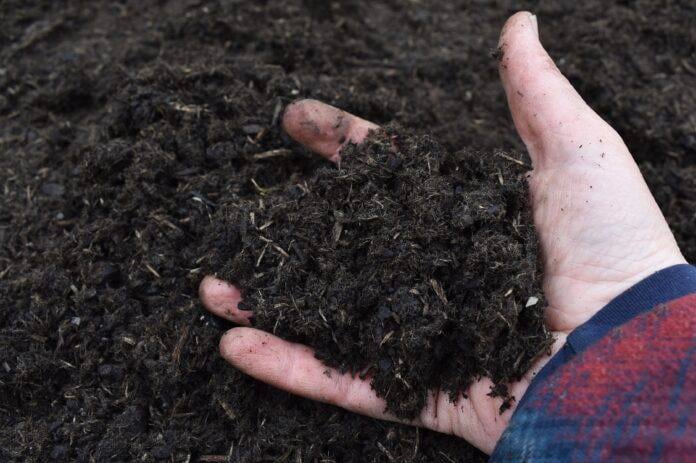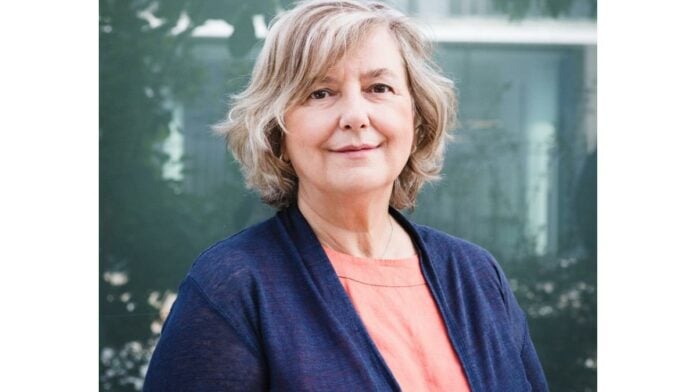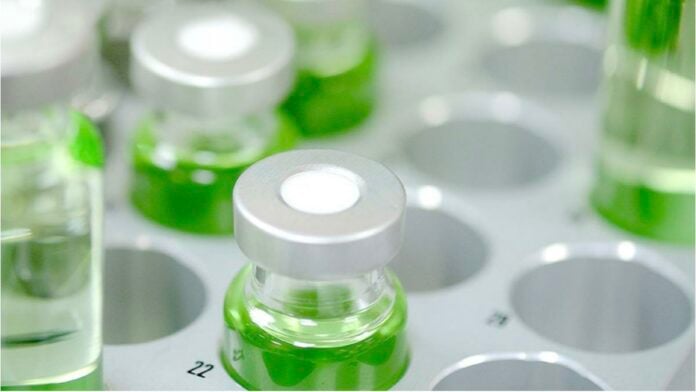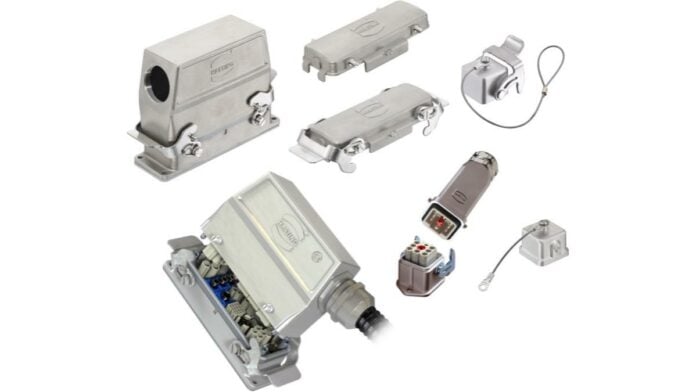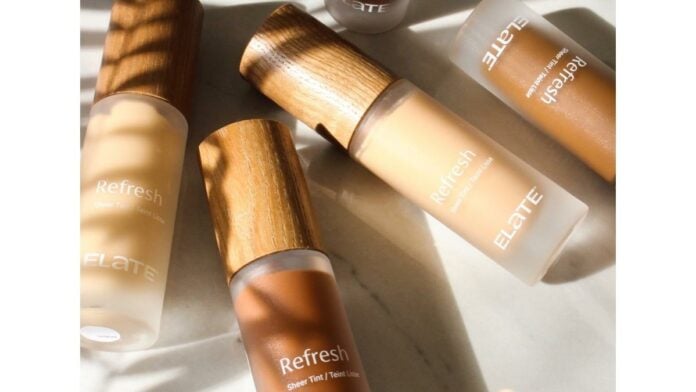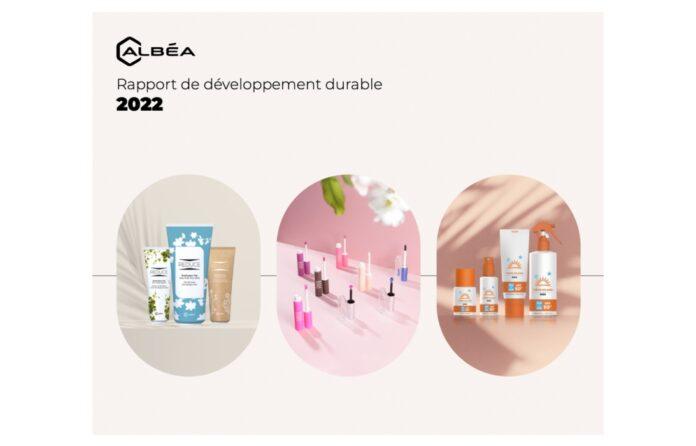Cosmetic 360 has built its conference program around the theme of cleantech. Organized into four half-days, each focusing on a specific theme, the conferences are held at the heart of the show, with free admission.
Molecules to regenerate the skin
Patricia Rousselle, a specialist in skin healing and regeneration, is one of four winners of the CNRS Innovation Medal 2023. Created some ten years ago, this award highlights the transfer of outstanding innovations from public research to the marketplace. It illustrates the diversity of ways in which it is possible to add value to a product, while at the same time pursuing high-quality research.
CNRS Research Director, Tissue Biology and Therapeutic Engineering Laboratory1Patricia Rousselle studies the dialogue between cells, both dermal and epidermal, and the proteins present in their microenvironment. Her work has led her to develop treatments for burn victims, post-surgical healing and tumors affecting the skin.
Patricia Rousselle has synthesized numerous bio-inspired molecules, representing eleven patents, which have aroused great interest in the pharmaceutical and cosmetics industries. She has worked in close collaboration with Dior, Chanel, Symatèse, 3-D Matrix, Native, Nagase and Laboratoires d'Anjou. A molecule of her own creation, for example, is at the heart of the Cébélia range of balms, renowned for their skin repair, regeneration and rejuvenation action.
1. CNRS/Université Claude Bernard Lyon 1
Photo: © Frédérique Plas / CNRS Images
A new range of active ingredients for the nutraceuticals market
Groupe Berkem, a leading player in plant-based chemistry, announces the launch of Biombalance, its new range of premium active ingredients for the nutraceuticals market.
Olivier Fahy, Chairman and CEO of Groupe Berkem, comments: "We are particularly proud to be able to offer our customers a range of natural active ingredients with scientifically proven human health benefits. With the launch of Biombalance, we are pursuing the strategy of broadening our offering that we initiated with the acquisition of i.Bioceuticals at the beginning of the year, giving further credibility to our positioning in this fast-growing market. We are convinced that we can make the most of our historic expertise in plant extraction in this business segment, which is particularly stimulated by innovation and attentive to the naturalness of products.
Eric Moussu, Groupe Berkem Sales Director, adds: "This new range of premium active ingredients represents the culmination of long-term work by Groupe Berkem's R&D teams, and once again demonstrates the quality of the solutions we offer to players in the health, beauty & nutrition sectors. Indeed, in addition to reinforcing the group's international development strategy, we are now in a position to offer the nutraceutical market ethically sourced ingredients, rigorously selected for their active molecules with a favorable impact on digestive health and scientifically proven virtues."
Drawing on Groupe Berkem's longstanding expertise in plant extraction and active ingredient development, the Biombalance range of premium ingredients meets the demand for dietary supplements that help balance the intestinal microbiota, a health issue affecting millions of people around the world.1.
Thanks to its in-depth knowledge and expertise of plants and their active molecules, Groupe Berkem has selected ingredients that act on microbiotic balance, restoring the intestinal barrier, reducing oxidative stress and restoring immune tolerance. The flagship product of this new range, Symgrape, is a premium active ingredient derived from the extraction of polyphenols from grape seeds, one of the company's historical activities, themselves rigorously selected, sustainably sourced and endowed with significant scientifically-proven benefits for intestinal health.
With this new range, Groupe Berkem is strengthening its position in the fast-growing nutraceuticals market, and more specifically in the segment of dietary supplements for intestinal health, estimated to be worth $38.8 billion in 2021.2 which is expected to grow by nearly 9 % per year between now and 20313. This product launch also follows on from the acquisition of i.Bioceuticals in February 2023, which gave the Berkem Group a foothold in North America, the world's leading nutraceutical market.4where Groupe Berkem has been distributing its natural active ingredients for decades.
Alongside Symgrape, the Biombalance range includes three additional premium ingredients with recognized benefits for the health of the human microbiota: Symint, Mallowsym and Symthym.
Groupe Berkem will present its new nutraceutical range for dietary supplements on October 25 and 26, 2023 at SupplySideWest in Las Vegas.
1 Lajoie F, et. Al,. Medicine / Science. Irritable bowel syndrome: Role of the intestinal microbiota, 2021. Actif's MAG n°82. Digestive health: active ingredients play the plurality game, 2023.
2 Supplement Business Report, 2023 Informa, Nutritionbusinessjournal ; Actif's MAG n°82. Digestive health: assets play the plurality, 2023.
3 Actif's MAG n°82, Digestive health: active ingredients play the plurality game, 2023.
4 Supplement Business Report, 2023 Informa, Nutritionbusinessjournal.
ICG announces acquisition of Dessange International group
ICG, one of the world's leading alternative asset managers, has acquired all the shares in D. Participations, the holding company of the Dessange International group, previously held by the investment company Eurazeo.
"ICG has a perfect knowledge of the Dessange International group, its brands, its positioning as well as the management team with which it has been working since 2016 on financing operations, which has created a mutual understanding and trust."says ICG.
Dessange International, positioned in the high-end hairdressing market, is organized around three core businesses: franchising with two international hairdressing brands (Dessange and Camille Albane) and a North American hairdressing brand (Fantastic Sams); products and distribution with its subsidiary DBA, including Phytodess, its international natural hair treatment brand, and Coiff'idis, a French specialist in the distribution of hairdressing products and equipment to professionals; and Dessange licensing. The company has 1,400 franchised salons in 36 countries, 1,070 of which are exported.
Nathalie de Courcy appointed Director of Government Affairs at Cosmed
Cosmed, the network representing the French cosmetics industry's VSEs, SMEs and ETIs, has announced the creation of a new government affairs department within the association. This position will be held by Nathalie de Courcy.
"Cosmed's development and growing role in concrete policy decisions affecting the cosmetics industry call for the creation of a new position to support the President's missions.says Cosmed.
With a doctorate in organic chemistry, Nathalie de Courcy began her career in 2004 in scientific and marketing positions. In 2016, she turned her career towards public affairs. She worked for the Île-de-France Region as a project manager for the health, finance and general administration commissions, then for the French National Assembly as a parliamentary attaché. Thanks to this dual career path, in 2018 she was appointed Head of Government Affairs at the Janssen pharmaceutical laboratory.
Involved in associations and politics, particularly on the theme of gender equality, she is a director of "Femmes Ingénieures", an ambassador for "IndustriELLES" and deputy deputy for Boulogne-Billancourt.
In addition to its role as an interface with the government, it will be involved in the success of Cosmed's actions and policy in the regions, notably through Cosmed's regional Cosmetopoles.
A stainless steel connector adapted to the constraints of the cosmetics industry
Harting's rectangular connector is now available in a stainless steel version. The housing dimensions are the same as those of the standard connectors in the Han B range, hence the name "Han-Inox B".
Made from high-grade stainless steel resistant to chemicals and corrosion, these enclosures are ideal for use in harsh environments.
The Han-Inox B is made exclusively of stainless steel, including the locking lever, ensuring sturdy, reliable operation.
Harting guarantees the use of the Han-Inox B range with a plethora of existing solutions. In particular, all 10 A and 16 A inserts can be used, as well as all special inserts for connecting high currents and voltages. Han-Modular solutions combining modules in a single connector are also compatible.
The possibilities are endless, allowing power, signals and data to be connected together or separately.
Resistant to detergents and cleaning products, Han-Inox B is particularly recommended for the food, pharmaceutical and cosmetics industries.
Adapted to the constraints of the saline environment, it can also be used in coastal areas. Its DNV certification extends it to maritime and offshore applications. UL 50 : Nema Type 4/4x/12 guarantees corrosion resistance for indoor and outdoor use, with watertightness against wind-blown dust and rain, and protection against damage caused by ice formation.
Elate Beauty: kindness wrapped in wood
Quadpack creates a range of reusable and recyclable packaging with wooden components for North American company Elate Beauty.
North American brand Elate Beauty believes that beauty should be kind to people, animals and the planet. Its cosmetics range is vegan and cruelty-free, and over 95 % of its packaging is reusable, recyclable or plantable. All beautifully decorated with sustainable wood. The company is part of the growing community of B Corp companies, a certification awarded to companies meeting societal and environmental requirements. So there was synergy with its new packaging supplier Quadpack, also a B Corp company with offices in Dallas, Texas.
Quadpack has designed the packaging for its Prep Priming serum and Refresh foundation. Both packs are refillable, recyclable and feature caps and components made from ash wood from sustainably managed forests. Designed and manufactured at the Quadpack Wood factory in Spain, they fit perfectly with Elate's message of "kindness".
Prep, Elate's smoothing make-up base, is housed in Quadpack's 30 ml Skin-Up glass bottle with wooden neck, featuring a teat dropper for targeted application. Elate's best-selling Refresh liquid foundation is also packaged in a 30-ml Skin-Up glass bottle, dispensed by a practical push-button dropper. The frosted effect, use of color and silk-screening add the finishing touch to this collection.
Customers can clean and reuse pumps and droppers, and purchase refills separately. At end-of-life, droppers and bottles can be classified as household waste or returned for responsible end-of-life. Thanks to Elate's partnership with the non-profit recycling collective Pact, all its packaging can be returned for recycling, by post or at any of its outlets in North America.
L'Oréal creates an endowment fund for the climate emergency
The L'Oréal group has announced the creation of a new 15 million euro fund to build the resilience of vulnerable populations in the face of climate-related disasters. This "Climate Emergency Fund" will support communities in the most exposed areas by enabling specialized partner organizations to assist populations in preventing and rebuilding in the face of such events.
Climate-related disasters are estimated to have increased fivefold over the past 50 years1. Today, nearly three billion people live in high-risk areas, and this figure could rise to four billion by 2050.2. The L'Oréal Climate Emergency Fund will help vulnerable populations through partnerships with local organizations and international NGOs specializing in disaster relief. It builds on L'Oréal's historic commitment to tackling ever-increasing humanitarian and environmental challenges, and follows on from other initiatives, such as the "L'Oréal Fund for the Regeneration of Nature", the "Circular Innovation Fund" and the "L'Oréal Fund for Women", bringing the group's total investment to over 200 million euros.
"As a global industry leader, L'Oréal has a duty to respond to the most pressing environmental and social needs, said Alexandra Palt, Managing Director - Corporate Social Responsibility and L'Oréal Foundation. The climate crisis we are facing requires urgent global action and mobilization, at all levels and on all fronts. With this new L'Oréal Climate Emergency Fund, we are reinforcing our commitment to accompany vulnerable communities towards greater resilience, in collaboration with organizations that are deploying innovative solutions on the ground."
The fund will focus on two types of action: "prevention", to help minimize the impact of climate-related disasters before they occur through planning and early warning systems; and "reconstruction", to restore essential infrastructure and vital services such as healthcare, housing and access to food and water after such disasters. The first two beneficiaries of the L'Oréal Climate Emergency Fund are The Solutions Project, a US-based non-profit organization, and Start Network, a global alliance of more than 80 local, national and international NGOs, which work on the front line to provide rapid and effective responses to prevent and manage humanitarian crises.
"While the climate crisis is global in nature, it is clear that some communities are much more at risk from short-term climate disasters, the impacts of which must be mitigated to prevent them becoming human catastrophes, said Christina Bennett, CEO of Start Network. In partnership with L'Oréal and local organizations that work closely with their communities, we will support people exposed to this type of risk, so that they can prepare and protect themselves, with the help of local teams. These teams know their situation inside out, and have the best expertise to ensure that affected populations recover more quickly after a disaster."
1. World Meteorological Organization (2021), WMO Atlas of Mortality and Economic Loss from Extreme Weather, Climate and Water Events, 1970-2019 (WMO-No. 1267).
2. Intergovernmental Panel on Climate Change (IPCC, 2021), Contribution of Working Group II to the Sixth Assessment Report: Headline Statements from the Summary for Policymakers.
BeautyMix becomes MyCosmetik
Nelly Pitt, founder of BeautyMix and a regular on M6's "Qui veut être mon associé?
Thanks to this merger, BeautyMix has chosen to become MyCosmetik, offering a global and holistic approach to natural well-being, through :
- A wide range of over 1,000 products: certified organic ingredients, as well as finished products, customizable bases, phyto and aromatherapy (the brand's best-sellers include the customizable anti-aging serum, Sommeil dietary supplements and Roll On essential oils).
- A clever robot that has become one of the iconic products making it easy to create homemade cosmetics at any level.
- Accessories, books, advice and 140 recipes available free of charge: the first open source for beauty.
MyCosmetik is also an extensive distribution network, an in-house French supply chain and a new production line. Last but not least, BeautyMix and MyCosmetik have expanded their team of experts to more than twenty people.
"This new page is a great milestone for BeautyMix, which becomes MyCosmetik, and a wonderful opportunity to continue our development, and the democratization of other consumption models. We're retaining real know-how and motivated teams, and together we're proposing a natural consumer alternative, enabling us to get back to basics, to what really counts and works, to what makes sense for the beauty and well-being of the whole family".explains Nelly Pitt, founder of BeautyMix.
For BeautyMix: an unprecedented acquisition at the heart of the company's development
From the outset, BeautyMix's mission has been to enable as many people as possible to start making their own homemade cosmetics with ease, thanks to a selection of natural ingredients, a clever robot and a free step-by-step application.
With the acquisition of MyCosmetik, BeautyMix is now able to offer a comprehensive range of wellness products, including aromatherapy and phytotherapy, rather than just cosmetics, something that the BeautyMix community has been calling for for some time.
The experts in home cosmetics are introducing a new approach:
- offer the possibility of creating your own beauty products at home, with more ingredients and recipes,
- or use neutral bases that can be personalized with active ingredients for targeted, effective care,
- or use organic finished products.
"MyCosmetik, which now incorporates the experience and expertise of BeautyMix, is aimed at a wider target audience. All consumers, whether connoisseurs or beginners in the field of homemade cosmetics, enthusiasts of homemade products as a whole or those who want to take the plunge, can find on our site the ingredients and the robot that make life easier, recipes and advice in open source... And this acquisition also enables us to be more accessible in terms of price! "continues Nelly Pitt.
For MyCosmetik: a merger that opens a new chapter in its history
MyCosmetik, launched in 2011, had one goal: to get back to basics, to what really counts and works, to what makes sense for beauty and well-being, by doing away with all the superfluous and focusing on a single point: effectiveness.
In difficulty since the opening of physical stores at a time when the Covid epidemic was taking hold in France, MyCosmetik is continuing its Made In France adventure thanks to its takeover by BeautyMix, and retaining jobs (eight people are joining the BeautyMix team, already made up of 14 employees).
MyCosmetik also maintains its supply chain in the Rhône-Alpes region, relaunches the brand under the MyCosmetik name, enriches its offering with the BeautyMix robot and free mobile application, and expands its product range with new active ingredients.
MyCosmetik is becoming the brand for natural skincare and well-being essentials, giving consumers back the power to make the right choice. Numerous projects are already in the pipeline.
Reaffirmed international ambitions
Already distributed in Belgium, Switzerland, Luxembourg and Germany, BeautyMix, which became MyCosmetik on September 15, 2023, aims to pursue its international development. Thanks to the MyCosmetik distribution network, and in particular its presence on the giant Amazon, BeautyMix is aiming to expand across the Atlantic.
Developing your logistics strategy
In 2022, BeautyMix entrusted the management of its logistics strategy for the preparation and dispatch of orders to its French and international customers to a player based in the Paris region. From now on, all logistics management will be handled by MyCosmetik.
Integration of the MyCosmetik catalog into the mobile application
The full range of MyCosmetik products has been integrated into the BeautyMix mobile application, expanding the options available for personalized cosmetic creations.
Developing the distribution network
The brand now benefits from 550 BeautyMix points of sale, 174 Monoprix stores, Rougier&Plé as well as Leclerc pharmacies and parapharmacies, and concept stores. Its presence on the Internet giant Amazon also enables them to broaden their field of distribution. This represents over 750 physical and digital points of sale.
"Accessibility and affordability are key aspects of the brand. The community can easily make their own recipes and products while respecting their health and our environment, and that remains our main objective."explains Nelly Pitt, now CEO of MyCosmetik.
Albéa publishes its 5th sustainable development report
Halfway through its ambitious 2020-2025 CSR journey, the Albéa Group has published its 5th annual voluntary sustainable development report.
This year's report highlights the efforts made by all teams, the CSR achievements of 2022 and progress on most plans to 2025:
- Accelerating the transition to solutions with lower environmental impact.
- Development of shorter, more transparent and traceable supply chains.
- Reducing energy consumption in plants.
For Julian Waldron, Albéa's Managing Director: "Today more than ever, the challenge is to move to a circular business model and help our customers do the same. This requires a systematic approach across our entire value chain: from innovation and the supply chain to the manufacturing process. Ensuring Albéa's sustainability therefore means rethinking our business. That's why CSR is at the heart of all our operations and decisions - and carried by every one of our employees."




